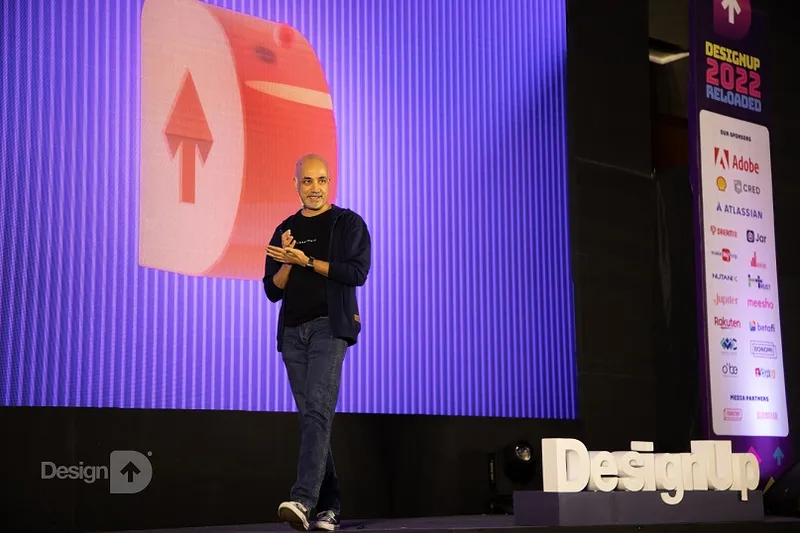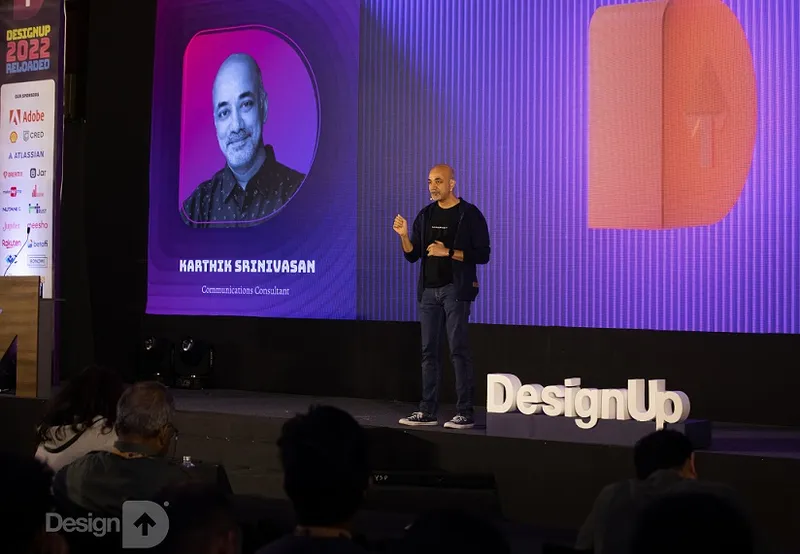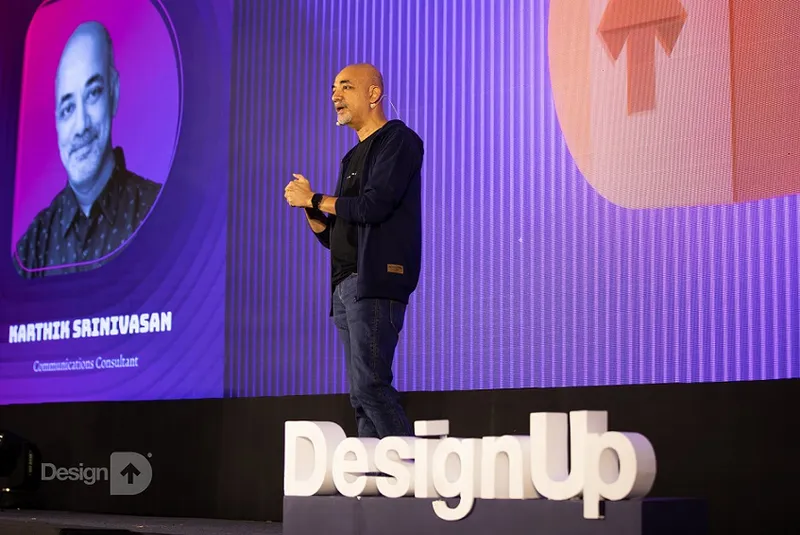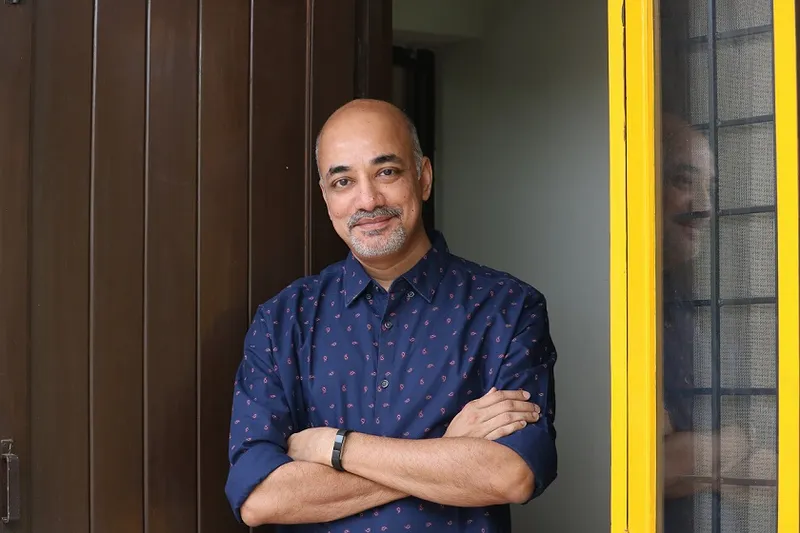‘Your personal brand sets your reputation’ – communication tips from Karthik Srinivasan, DesignUp 2022
As media partner for the DesignUp 2022 conference, YourStory presents speaker insights on media, communication, and entrepreneurship.
Karthik Srinivasan is a communications strategy expert, specialising in branding, marketing, content, social media, and corporate training. He was earlier National Lead, Social@Ogilvy; AVP - Corporate Communications, Flipkart.com; and Head of Digital Strategy, Edelman.
Karthik also spoke at the DesignUp 2022 conference in Bengaluru, for which YourStory was media partner. See YourStory’s earlier coverage of conferences and sessions from 2021, 2020, 2019, 2018, and 2017.
The Bengaluru-based consultant joins us in this interview on communication trends, learning from failure, social media tips, and branding for entrepreneurs.
See also YourStory’s Book Review section with takeaways from over 350 titles, and our d-Zen (‘Design Zen’) section for more design resources.
Edited excerpts from the interview:

YourStory [YS]: What are three key trends you are seeing in the field of communication and design in India?
Karthik Srinivasan [KS]: 1. Individual silos are breaking down in very obvious ways. PR agencies used to be about media relations at one point. Now they do everything that even ad agencies do! Ad agencies used to be about creativity, but now they have to sell their ads to the media too, on their own, besides talking about their work on social media.
Client-side corporate communications teams used to be about managing internal teams, but now they have to consider active and ongoing social media communication too without expecting it to be fully outsourced to agencies.
2. Regional communication is getting its long-overdue focus. A single pan-India communication is not the default anymore. Ironically, the film industry is showing the way in this regard – what was considered 'South' has become pan-India now.
3. There is a lot more understanding and awareness on design now as evidenced by how startups use it to their advantage. CRED is a good example.
YS: That’s quite a creative streak you have – from PR to employee communication! How did that come about?
KS: Actually, it is public relations, to corporate communications, to digital marketing, to advertising, and marketing, in that order! I don't know how this came about but I'm glad to have traversed almost the entire stretch of the communications landscape across both agency and the client side.
YS: Tell us about your work these days. What are the challenges and opportunities you face?
KS: The biggest challenge is that of having a steady stream of clients. To a large extent, my ongoing effort in personal branding takes care of that.
Usually, freelancers depend on a network of connections for a new business. I believe that networking is way too limited and personal branding helps open more doors toward business leads.
YS: What have been some of your experiences with failure and mistakes? How does a creative person learn, cope, and move on?
KS: The starting point is humility. And humility is perhaps something that you learn more with age!
But accepting that one doesn't know everything, and need not either, is a good beginning to learn from mistakes and failures. Being open to being wrong about things is another dimension of that humility.

[Year in Review] Meet these Indian women who used social media to drive change and social impact
YS: In a world of increasing fake news and hate speech, how can effective communication come to the rescue?
KS: To be sure, even the success of fake news and hate speech is a showcase of effective communication, ironically. If fake news and hate speech are persuasive, that affects society in terrible ways. That's where honest and timely counterpoints to fake news and hate speech can come to help.
As the famous dialogue from Christopher Nolan's Inception goes: “What is the most resilient parasite? Bacteria? A virus? An intestinal worm? An idea. Resilient... highly contagious. Once an idea has taken hold of the brain, it’s almost impossible to eradicate.”
Fake news and hate speech use this as much as their counterpoint to them. The key is to diffuse fake news and hate speech at the earliest in the most persuasive manner.
YS: Many of our readers are tech startups. What is your advice to them on when they should start seriously integrating design into their journeys?
KS: From Day Zero! What you do, sell and communicate is as important as how you do it, sell it, and communicate about it. The 'how' can make or break the 'what'.
YS: What are the challenges faced while moving from a designer or communicator role to becoming a manager of teams? How can the challenges be tackled?
KS: Managing teams is a completely different mindset from being a designer or a communicator. Just as one gains specific knowledge or education for being a designer or a communicator, it may be prudent to seek professional help or education before taking on a manager role instead of just winging it.
YS: You are very active on Twitter. What are some of your tips on effective communication, dealing with trolls, and staying creative?
KS:
For effective communication: Read 10X more than you share.
Dealing with trolls: Easier said than done, but ignore them and move on!
Staying creative: Read relevant (to your field) content every day, and write every day. That helps the cycle of input and output of thoughts and ideas.

[Year in Review 2021] 10 inspiring stories of people who made the world a better place
YS: Is there a particular age when people are most creative, or can the creative bug strike you at any time?
KS: I do not believe creativity is age-specific. The younger you are, you may perhaps bring fresher ideas but the older you are, you may have more dots to connect from your exposure and experience. Both can be valuable.
YS: How did the pandemic affect your work and other activities? How did you cope?
KS: My freelance consulting work is mostly online and digital, and it only became more so during the pandemic.
Even my day-long corporate workshops on personal branding for business leaders went online via video calls instead of being conducted in exotic locations in company offsites! But things are getting back to the old ways now.
YS: What new projects or activities are you involved in these days?
KS: I'm engaged with a leading bank's senior management team in terms of helping them with their personal branding journey. I'm also consulting an international VC firm on content strategy.
I usually take up shorter assignments of two-three months at a time, and that helps me find interesting and challenging work on an ongoing basis.
YS: What are five must-read books about communication that our audience should have?
KS:
1. Ogilvy on Advertising - by David Ogilvy
2. Marketers Are From Mars, Consumers Are From New Jersey - by Bob Hoffman
3. One Plus One Equals Three - by Dave Trott
4. The Attention Merchants - by Tim Wu
5. The Art of Immersion - by Frank Rose

YS: What was your experience like as a DesignUp speaker, and what are some must-attend conferences in your field?
KS: The DesignUp experience was very good! This was my first DesignUp, despite knowing both organisers Shiva and Jay for a very long time. I had assumed that the kind of 'design' the event focuses was not my kind of 'design' (communications design) but I figured how wrong I was when I attended the event!
The way the event thinks of 'design' is on a much wider canvas that encompasses a lot more. I'd say PRAXIS is also a must-attend event for my field, it's an annual event for communications professionals.
YS: What is your parting message to aspiring entrepreneurs in our audience?
KS: Regardless of your work status – an employee, founder, entrepreneur, or freelancer – work on your personal branding in a structured manner. Your personal brand sets your reputation among a larger set of weak ties and acts like insurance when there is a need.
Before we work on other brands in any capacity, we are all the CEOs of our own self - Me, Inc. Take that role seriously!
Edited by Teja Lele







